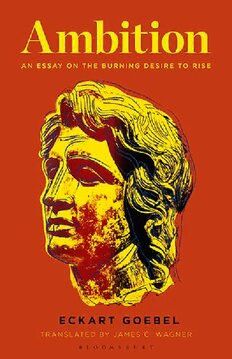
Ambition: An Essay on the Burning Desire to Rise PDF
273 Pages·2022·2.095 MB·English
Most books are stored in the elastic cloud where traffic is expensive. For this reason, we have a limit on daily download.
Preview Ambition: An Essay on the Burning Desire to Rise
Description:
Why does ambition continue to drive people on even after their safety and livelihood are secured? We describe people as ‘consumed’ or ‘devoured’ by ambition as they might be by a predator or an out-of-control inferno. But is it possible to establish a clear distinction between ‘healthy’ and ‘pathological’ ambition?These questions have been raised since the ancient Greek poet Hesiod differentiated between the good and the bad goddess Eris. Ambition as a longing for immortal fame seems to be exclusively human and has been approached with ambivalence and often trepidation since antiquity. Whilst philosophy has touched only occasionally on the problem of burning ambition, sociology, psychoanalysis, and world literature have provided rich and more revealing descriptions and examples of the role of ambition in human history.Drawing on a long and varied tradition of writing on this topic, from authors and thinkers that range from Hesiod to Kafka and from Shakespeare to Freud, and from a history that moves from ancient Greece and Rome via Italian Renaissance to modernity, Eckart Goebel explores our driving passion for recognition–an insatiable hunter in the mirror–and power.
See more
The list of books you might like
Most books are stored in the elastic cloud where traffic is expensive. For this reason, we have a limit on daily download.
